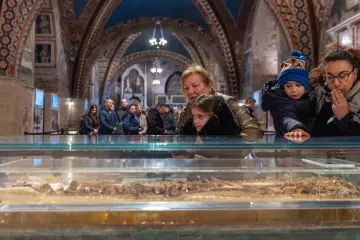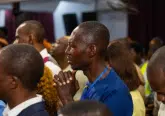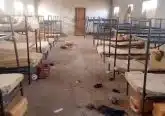Nigerian Catholic parish hard hit in latest raid
Washington, D.C. Newsroom, Jun 21, 2022 / 14:40 pm
An early morning raid Sunday by terrorists in north-central Nigeria hit a Roman Catholic congregation hard.
“We lost three of our parishioners, and 36 people were kidnapped, the majority of whom were Catholics,” Father Francis Agba, pastor of St. Moses Church in Rubu, told CNA via text message.
“This is the third attack against this village in this month alone and the latest of 15 attacks in the 17 outstations of the parish this year,” he added. Agba is the head of St. Augustine’s Parish which has 17 churches, one of which is St. Moses.
The three churches were in a complex of villages called Rubu in Kajuru County, approximately 30 miles south of Kaduna City in north-central Nigeria. Other churches attacked included Maranatha Baptist and Evangelical Church Winning All.
The abductees included 31 females and five males, according to Jonathan Asake, the head of Southern Kaduna Peoples Union (SOKAPU), an umbrella group for all Christian communities in the State.

Worshippers told reporters that they had decided to attend the 7 a.m. service in hopes of lessening the chance of becoming victims of terrorists who have struck the village many times in recent years.
The terrorists thwarted those plans. When the shooting started the congregants ran toward the forest but three lost their lives, said Agba, the St. Moses pastor.
Another attack the next day
The village of Gwando, 10 miles east of Rubu, was swarmed by terrorists Monday, according to Stingo Usman, a community leader in Maraban Kajuru. “No one was killed because the villagers ran into the forest, but their animals were rustled,” Usman said
Nigerian security forces attempted to respond to the attack in Rubu an hour after it began but changed plans after hearing that the bandits had left the town with their hostages, Usman said. “The military then decided to meet the bandits at Kutura Station, but abandoned that effort due to bad roads,” Usman said. Kaduna Police spokesman Mohammad Jaliga Kumo did not respond to CNA’s request for comment.
The attacks are part of a systematic campaign by Fulani bandit gangs to force the majority-Christian farmers off of the land in southern Kaduna, Asake said. The Sunday morning raids came nine days after a June 5 bandit assault on three villages approximately 12 miles away that left 32 dead and 12 wounded, Asake said. The villagers attacked in that raid on June 5 reported that a helicopter hovered over the village and fired rounds that killed or wounded residents of the village instead of the terrorists. The Kaduna State Commissioner for Public Security disputed the claim, but the villagers have held firm in their version of events.
In that earlier raid 27 villagers, chiefly women, were abducted. The bandits have since contacted relatives using the abductees’ cell phones and demanded a ransom of the equivalent of $1,300 per person, Asake said.
“We told the bandits that most of the captured women are widows whose husbands were killed in previous attacks,” Asake said.
“Their answer was that the women could be returned in lieu of a promise that our villagers will not go to their farms carrying any weapons,” he said. “They cannot carry even a machete, making them utterly defenseless during the next attack.”
“The International Committee on Nigeria believes the Fulani militants have an attack strategy to instill fear, cause displacement, and allow occupation of Christian farms,” Kyle Abts, executive director of the International Committee on Nigeria (ICON), told CNA. The goal is to disrupt these farmers from generating a harvest and a wage. After leaving the area, these lands will be re-occupied by Fulani herders and their families,” Abts said.
The spate of attacks targeting Christian churches has been attributed to “communal violence” by analysts with the Council on Foreign Relations and the result of “clashes over land and water resources” in reports by the U.S. Department of State.
Human rights scholars who spoke to CNA sharply disagree with those characterizations. They say the massacres in Kajuru are part of a long-term campaign by radicalized Muslims to Islamicize the whole of Nigeria.
The widespread killings by terrorist gangs along with the Islamist insurgencies of Boko Haram and Islamic State of West Africa have taken more than 350,000 lives since 2001, said Abts, of ICON.
“The overall aim of the terrorists is economical and partly religious,” Father Agba said. “Partly religious, because many Muslims have fallen victim, too, but the frequency of the attacks is much more on the predominantly Christian parts of the state.”
The gangs that have terrorized the state of Kaduna with mass kidnappings of college students and groups of motorists on the highways have grown wealthy and powerful since they emerged in the northwestern state of Zamfara in 2011, according to bandit expert Dr. Murtala Rufa’i, a historian at the Usmanu Dan Fodiyo University in Sokoto. Scholars estimate that between 10,000 and 30,000 bandit terrorists are operating in five of Nigeria’s northwestern states.













